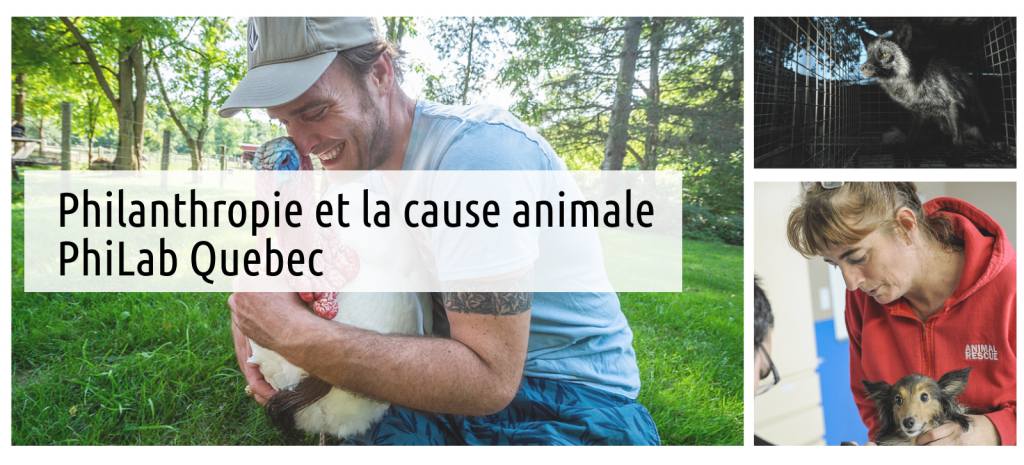
Based in Vancouver, BC, Erika manages the Charity Pot program at Lush North America. A long-time “Lushie”, Erika has spent the past 18 years living and breathing Lush’s values and beliefs. In public relations and retail marketing Erika helped the LUSH brand gain recognition as an ethical retailer. Years later she helped to form and transition onto Lush’s Charitable Giving Team, where she has dedicated her time ever since. Lush’s Charity Pot program, under Erika and her team’s management, has grown tremendously since its launch in 2007, granting $55 million to 3,200 projects in 83 countries. Erika’s passion for supporting grassroots movements to effect long-term systematic change, and her work in partnership with frontline communities is helping to contribute to philanthropy’s movement towards a more progressive and inclusive model of giving.
Interview by: Katherine Mac Donald
Katherine Mac Donald (KM): Could you tell us how Lush became involved in the advocacy space?
Erika Edwards (EE): From its founding in 1995 in the UK, Lush founders set out to create fresh and innovative cosmetics, but they also wanted to create a company based on their beliefs. One of their founding principles was embedded in animal protection, which led to a strict policy against animal testing. One of our founders, Mark Constantine, introduced a supplier specific boycott policy, which meant that Lush would not buy any ingredient from a supplier that tests any of its materials on animals. The policy goes beyond other standards like the Humane Cosmetics policy. The supplier boycott policy could be considered the roots of our advocacy. We’re also a 100% vegetarian company with 95% of our products counting as vegan.
As the company grew, Lush started campaigning and becoming more involved in fighting against animal testing on a global stage. We lobby governments, we campaign in our shops, and in 2012 we launched the Lush Prize. The idea of the Lush Prize came from the frustration that it was taking too long for cruelty free alternatives to be adopted into the mainstream. So, the business committed to providing 250 000 British pounds every year to fund a series of initiatives working to put an end animal testing. This includes supporting people in the fields of designing and testing alternatives, training scientists and regulators on non-animal methods, in addition to public awareness and lobbying campaigns. We feel it’s our responsibility to advocate for change on issues that we really care about as a business. We recognize that we have a platform to create awareness and engage staff and customers, so we leverage our retail and our online presence to create awareness and mobilize people.
KM: I remember going to a Lush store and seeing a campaign table against the harvesting of shark fins, am I correct?
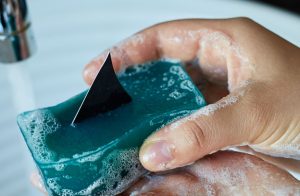
Shark Fin Limited Edition Product
EE: Yes, we have ethical campaigns that we run directly in our shops. We turn our shops into places where we can amplify the voices of non-profits and people advocating for animals, the planet, and human rights. And then sometimes with that, we have a limited-edition campaign product where we give 100% of the sales of that product to the partners that we’re working with on that campaign. We have run animal protection campaigns to ban the sale of shark fins, ban trophy hunting of bears in British Columbia, protect orangutans from deforestation due to palm oil plantations and expose the cruelty of the fur trade. The commercial seal hunt in eastern Canada was our very first campaign. Sometimes we’ll do more regionally focused campaigns, such as banning greyhound racing in Florida while others can be on a national level and not as specific.
KM: Can you recall any issues that may have arisen from promoting campaigns that conflicted with traditional indigenous practices in a specific region, such as the seal hunt?
EE: We’ve learned a lot since that first ethical campaign opposing the seal hunt. The campaign was aimed at ending commercial hunting. But we’ve learned that it didn’t go far enough to recognize Indigenous Peoples rights. We don’t oppose subsistence hunting for Indigenous People and after the campaign, and we had many conversations with Indigenous People in organizations about the harm it perpetuated. I think it’s been great for us to open those conversations and, in hindsight, our communication should have been more explicit., and it didn’t go far enough to recognize the rights of Indigenous Peoples. We recognize that we’re not always going to get it right one hundred percent of the time. And are grateful to those who support our learning. But ending the commercial exploitation of all animals is an issue that we still speak about.
KM: Lush is also a partner1 with The Circle on Philanthropy and Aboriginal Peoples in Canada (The Circle). What sparked the partnership and how does it relate to your corporate philanthropy model?
EE: The Circle is helping move the philanthropic sphere towards a more equitable, trusting and just way of supporting Indigenous communities. Over the past 10 years, Lush North America has been committed to supporting Indigenous-led organizations. Nearly 25% of our funding has gone to Indigenous right issues, whereas less than one percent of total philanthropic giving as a whole reaches indigenous communities. We’re always learning, or unlearning, and wanting to do more and do better. That’s where relationships with The Circle, or others like the Arctic Funders Collaborative and the International Funders for Indigenous Peoples (IFIP), help organizations to shift their philanthropy to repair past harms and decolonize the way giving is done. As a company, we’re working on implementing the TRC’s Call to Action #92 for business and reconciliation.
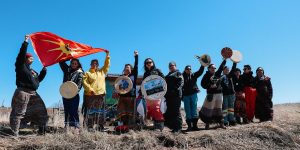
The EnRICH Project Charity Pot Partner
It has been deep and meaningful to bring everyone into the conversation, and to do the necessary work for reconciliation. An example of this relating to our Charitable Giving Program, is an evaluation, where we partnered with IFIP to engage some of our Indigenous- led and BIPOC-led Charity Pot Partners to review and provide anonymous feedback on the language we are using in our grant application, funding summary, funding agreement, and overall experience in order for us to have the process be, accessible, equitable and inclusive. We are now working on these recommendations.
We’re also looking at alternative application and grant reporting formats. We’re hearing the feedback that some applicants and grantees experience in the process, and talking with other funders that have adapted their methods to break down barriers. In some cases, funders allow grant applicants and funding reports to be in the form of a text message, images, or requiring no paperwork at all, cutting out the work involved in grant writing and reporting. It moves away from the traditional way of doing things and towards a trust-based approach.
KM: With the Charity Pot being the main granting program, can you tell us how it started?
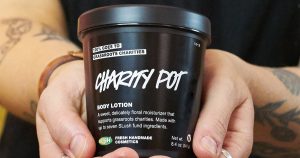 EE: We have a product called Charity Body Lotion, where we donate 100% of its sales, minus the taxes, to small grassroots organizations working in the areas of human rights, animal protection and environmental justice: organizations that address the root cause of issues and work towards long term solutions. It launched in 2007 in the UK & North America, and now can be found in 36 countries where Lush operates. Charity Pot is celebrating our 15th anniversary this year, and to date in North America, we’ve raised close to 55 million dollars, supporting over 3000 projects in 83 countries.
EE: We have a product called Charity Body Lotion, where we donate 100% of its sales, minus the taxes, to small grassroots organizations working in the areas of human rights, animal protection and environmental justice: organizations that address the root cause of issues and work towards long term solutions. It launched in 2007 in the UK & North America, and now can be found in 36 countries where Lush operates. Charity Pot is celebrating our 15th anniversary this year, and to date in North America, we’ve raised close to 55 million dollars, supporting over 3000 projects in 83 countries.
KM: Why has Lush chosen to fund grassroots organizations instead of registered charitable organizations?
EE: Grassroots groups are the ones involved in such things as nonviolent direct action, campaigning, and advocacy that we believe mobilize and create the change that’s needed. By looking at groups that are challenging the mainstream and working on issues that are typically underfunded, we have an opportunity to fill a gap. Organizations that are rooted in community can have such an incredible impact. We don’t require groups to be registered, that way we can support activists on the ground. They have the liberty to lobby government, get on the street in protest and really be disruptors. When you’re a registered charity, you have parameters to work within. Non-registered groups often have difficulties finding funding and arguably, they’re the ones who need it the most.
KM: Has Lush ever had any major issues with the charitable giving program regarding backlash or any other challenges that might deter companies looking to adopt your funding method?
EE: On occasion, we’ve had customers or special interest groups not agree with our choice of groups to fund because they are edgy, controversial or they have a different agenda.
In some cases, it can be difficult to even find small groups because they don’t necessarily have the visibility the resources, or the bandwidth that larger organizations do. Over the years, we’ve created relationships with the activist groups that we’ve been supporting and with other funders in the same spaces. Our customers and staff are often out in communities which has also led organizations to become Charitable Pot Partners. The program has reached so many grassroots projects, that the word is out, and we’re getting known for what and who we fund.
KM: How can corporate philanthropy better support and understand the reality and needs of grassroots organizations?
EE: We often hear from our grantees that we’re one of the only companies or funders that support their type of work and mission. Yet, there is such a need for this type of funding. These groups that are working on a shoestring budget, sometimes off the side of their desk as volunteers, are filled with such passion. They’re so dedicated that they really need the support and trust from funders. Corporate philanthropy can be a bit hesitant in shifting to this approach and funding model because it’s risky. They may have shareholders and a board that they must answer to and lack the experience to guide them to a new way of thinking about their giving and identifying where those funding gaps are. It takes some time, but there’s a phenomenal opportunity for companies to fund youth-led, BIPOC-led, women-led, LGBTQIA2S+-led movements, new innovations, policy work, and nonviolent direct action. All that work moves us towards a more equitable and just society.
There are so many directions that funders can explore which could include for example a participatory grantmaking model and/or supporting indigenous-led funds. It’s important to get outside the comfort zone of how things have always been done or what is expected, and sometimes that is just dipping your toes in to start, but it is a start.
KM: With Lush’s roots deeply rooted in animal advocacy, what is your animal funding approach, and what would you say is the main challenge for animal-focused philanthropy?
EE: We look at tackling the underlying root cause of animal cruelty and then how can we support work aimed at systemic change. For example, it’s rare that you’ll see Charity Pot fund an animal shelter, rather the approach is to fund work so that animals don’t end up in shelters in the first place. Some issue areas we direct funding to include animals in captivity, animals used for fashion, animals for entertainment, co-existence with wildlife, culling and illegal trade of animals, and of course banning animal testing. As a vegetarian company, we are advocating for more plant-based lifestyles and ensuring we care for animals because they don’t have a voice. We listen to and learn from partners that are working on atrocious factory farm situations. If more people knew about the many cruel practices animals are subjected to, they would take action to put an end to it.
My advice to funders looking to fund animal rights or animal issues is to learn who is funding what in areas of animal rights, know what aligns with your organization’s beliefs and interests, and start creating relationships with animal protection groups, animal advocates and experts in the field.
KM: Erika, thank you so much for taking the time to share Lush’s innovative approach to charitable giving.
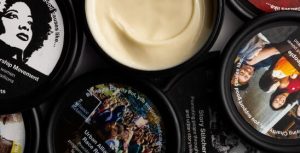
If you, or your company would like to learn more about the Lush giving model, we invite you to contact Erika directly, she would be happy to answer your questions: erika@lush.com
Cet article fait partie de l’édition spéciale de Janvier 2022 : Philanthropie et la cause animale. Vous pouvez trouver plus d’informations ici
